“Until now, focus on….the social determinants of health has been for government and civil society. The private sector has not been involved in the discussion or, worse, has been seen as part of the problem. It is time this changed,” asserts the report, The Business of Health Equity: The Marmot Review for Industry, sponsored by Legal & General in collaboration with University College London (UCL) Institute of Health Equity, led by Sir Michael Marmot.
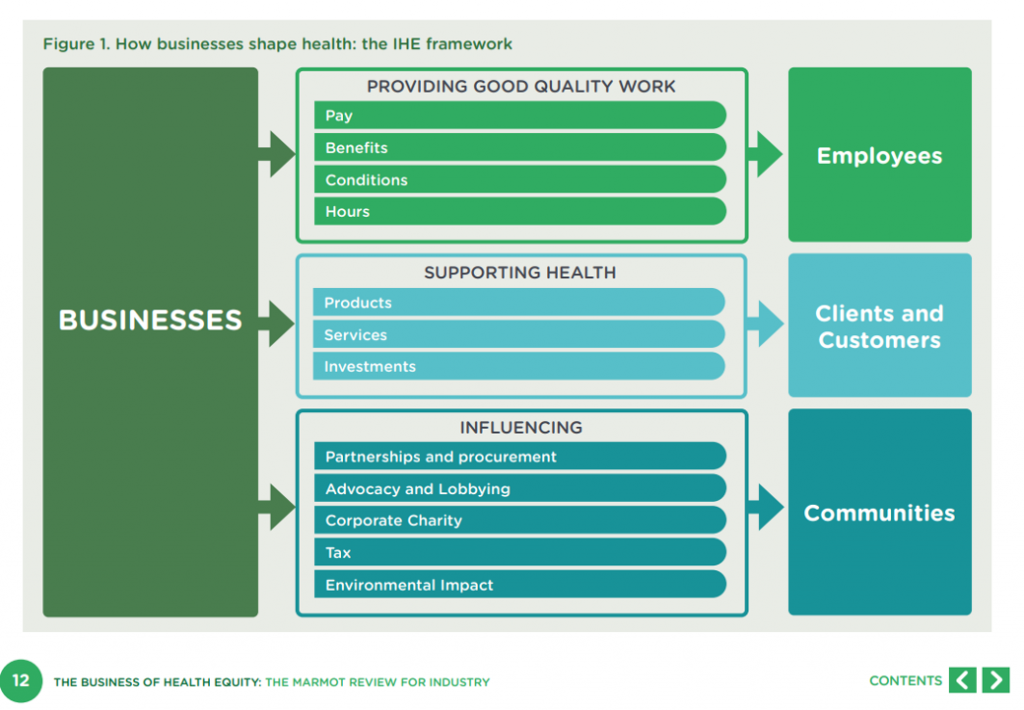
Sir Michael has been researching and writing about social determinants of health and health equity for decades, culminating publications such as The Health Gap: the challenge of an unequal world and Fair Society, Healthy Lives (aka “The Marmot Review.”)
Legal & General (a leading UK financial services firm) and UCL IHE are collaborating in a 4-year partnership to explore the role of business in reducing inequalities in health in the UK. This report has direct and relevant implications and insights for private sector stakeholders outside of the United Kingdom, as well.
The top-line is that it is in the interest of business to bolster health equity and ESG — environmental, social, and governance pillars. “Businesses can and should be responsible actors improving the quality of people’s lives and the environment, and as a result be forces for good in creating greater health equity,” Sir Michael writes in the forward to the report.
Sir Nigel Wilson, Group Chief Executive of L&G, notes, “There is a risk/reward point here: nobody wants to end up owning the health equivalent of a stranded asset coal mine, or an asset which may be taxed, regulated or litigated against. There is also a positive agenda — about how we can invest in better housing, better food, cleaner environments and better jobs to reduce the negative social determinants of health.”
The report offers three work-flows of how business can shape health equity, through:
- Providing good quality work
- Support health, and
- Influencing broader communities beyond the company itself.
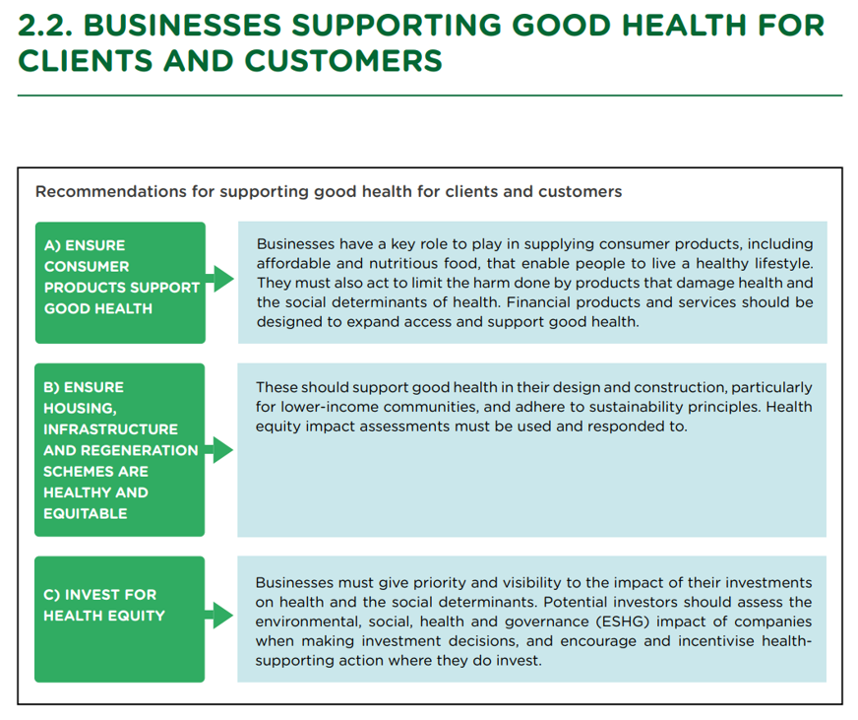
Fleshing out the second point, how businesses can support good health for clients and customers, the report offers three broad recommendations:
- To ensure consumer products that support good health, such as nutritious food, financial products that expand access, safe and clean transportation, and other goods and services that households purchase.
- To ensure housing, infrastructure, and regeneration schemes are healthy and equitable. This speaks to construction and physical designs that support sustainability, clean building principles, and accessibility.
- To invest for health equity, with businesses showing transparency, commitment and priority for allocating resources that manage the risks of social determinants of health.
The COVID-19 pandemic exacerbated already-disparate access to food and housing security, and this objective connects the dots between health citizens’ unmet needs for accessible nutrition and housing — costs for which are increasing due to supply chain and inflationary pressures this year. That then increases peoples’ risk for chronic health problems relating to nutrition — heart disease, diabetes, and obesity — all of which also portended worse outcomes due to complications from the coronavirus.
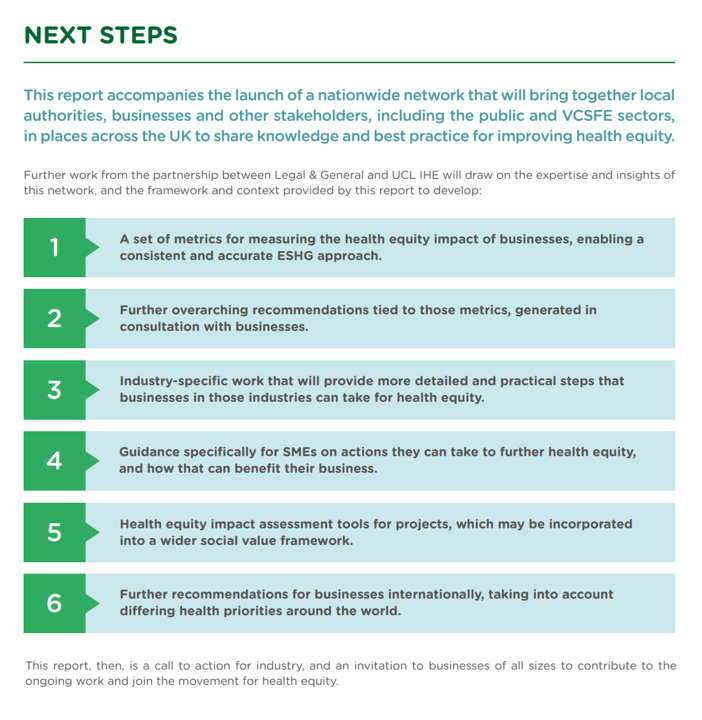
Legal & General and UCL IHE have begun to organize a network of collaborators in the UK, bringing together private sector companies with government/public sector agencies and community stakeholders to work together to address health equity.
The chart shows six workflows to support the call-to-action for industry, including:
- Developing metrics to measure the health equity impact of business, to allow for a consistent quantified approach to “ESHG”
- To develop further recommendations tied to the ESHG metrics with input from business
- For private sector businesses to develop and implement programs by industry to learn and share best practices for health equity
- To develop guidance for small and mid-sized enterprises (SMEs) that they can use to address health equity. This is important as larger companies may have more natural or obvious scale to take on SDoH programs and smaller firms may need some proof points and support to engage in and commit to health equity programs
- To develop health equity impact assessment tools for projects, and
- To work globally on health equity recommendations that recognize different priorities around the world based on economics, social values, and local factors.
You can hear more, directly, from Sir Michael in this video from Legal & General’s portal:
Health Populi’s Hot Points: The report shows why an “H” for “health care” should be added to ESG — environment, social, and governance goals — as core strategies for business, the report’s authors believe. They coin the acronym for this ESHG.
ESHB monitoring would enable consumers and investors to gauge what organizations are doing more and/or better to support peoples’ health.
That’s a capital “H” that’s all-inclusive, holistic on health: social health, physical health, mental and emotional health, and financial health.
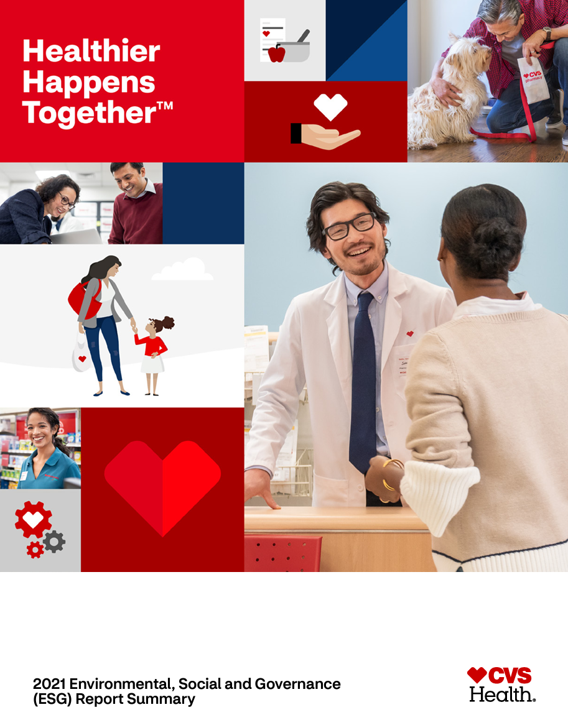
COVID-19 “demonstrated beyond doubt the importance to the economy of health resilience at every level,” Sir Nigel observed. We’ve begun to see businesses, and in particular those in the private sector health/care ecosystem, addressing aspects of determinants of health: housing, transportation, job training, wage increases. Consider:
- CVS Health investing in housing in various geographies where the company operates and staffs its stores
- Danone’s commitment to a health-embedded product portfolio, culminating in its B-corp filing
- Kaiser Permanente allocating resources for food security, and
- Walmart increasing wage packages to as high as $110K a year for truck drivers, essentially doubling salaries for their company’s fleet development.
There is a growing list of examples in this community, where the companies have begun to detail their ESG efforts in annual reports such as the most recent one from CVS Health.
If you work in a private sector organization, think about what your company can do to address some aspect of the determinants of health and the larger context of “ESHG.” You can do well, do good, and position your organization for greater success in the process…


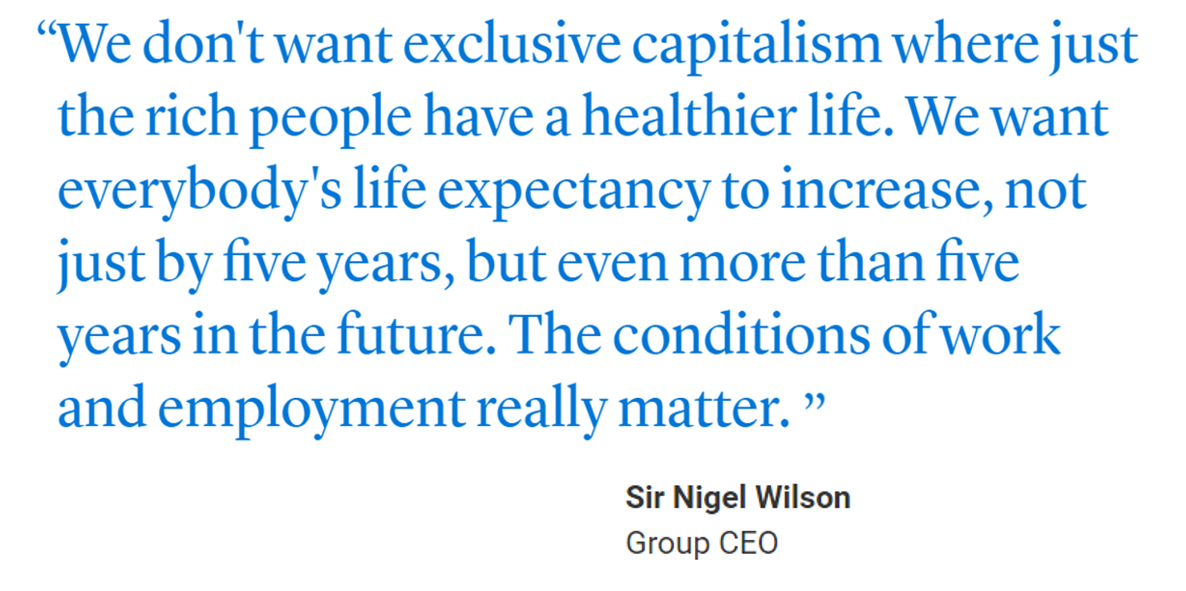


 I am so grateful to Tom Lawry for asking me to pen the foreword for his book, Health Care Nation,
I am so grateful to Tom Lawry for asking me to pen the foreword for his book, Health Care Nation,  I love sharing perspectives on what's shaping the future of health care, and appreciate the opportunity to be collaborating once again with Duke Corporate Education and a global client on 6th May. We'll be addressing some key pillars to consider in scenario planning such as growing consumerism in health care, technology (from AI to telehealth), climate change, and trust -- the key enabler for health engagement or dis-engagement and mis-information. I'm grateful to be affiliated with the corporate education provider
I love sharing perspectives on what's shaping the future of health care, and appreciate the opportunity to be collaborating once again with Duke Corporate Education and a global client on 6th May. We'll be addressing some key pillars to consider in scenario planning such as growing consumerism in health care, technology (from AI to telehealth), climate change, and trust -- the key enabler for health engagement or dis-engagement and mis-information. I'm grateful to be affiliated with the corporate education provider  Thank you FeedSpot for
Thank you FeedSpot for